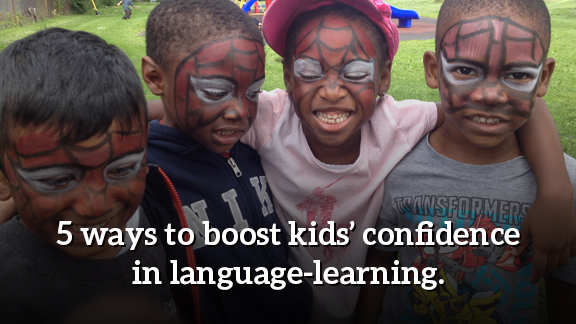Have you ever tried to learn something totally new?
Maybe you attempted an entirely new project at work? Or even a new recipe for a group of guests?
If you can think back to a time where you felt stretched outside your comfort zone, then you can appreciate how a dose of positive self-esteem helps you get through the challenge scot-free.
That feeling of unease and discomfort is not unlike what your child experiences when they are learning French. Their language-learning journey will include times when they feel uncomfortable and in doubt about their skills.
So how can you help improve your child’s self-esteem so that they learn with ease?
Well, I’ve compiled my 5 best ways to boost your child’s self-esteem so they learn French with much greater joy, passion and fulfillment.
#1: Open Your Home To French-Speaking Friends
Does your child have 2-3 good friends in their French immersion program? Or even a buddy that they met at  French camp?
French camp?
Just like having a supportive network is important for you to achieve your goals, a group of like-minded friends all on the French-learning path can help your child immensely.
Ask your child to invite them over for a French-themed get-together, and make it a fun day of French language and culture.
#2: Give Them Positive Affirmations
The next time you hear your child speak French or do their French homework, make sure their hard work doesn’t go unnoticed.
Give them meaningful compliments like, “I’m proud of how dedicated you are to learning French,” and “I get the sense that your French is really improving.”
Remember, it’s not easy to learn a new language. So receiving recognition for this new endeavor gives your child the positive encouragement they need to keep the momentum going.
#3: Set Them Up For Success
Have you ever noticed how nerve-wracking it feels to do an activity after being out of practice? It could be anything from getting back to the gym, or even getting back on a pair of skates.
The reason it feels difficult is because once you’ve been out of practice, your body has to re-adapt to the activity once again. This process takes time, but the more frequently you practice, the faster your mind and body adapt.
This is no different than when your child speaks French after being out-of-practice.
Now you may think that they get sufficient practice at school, but often, it’s not enough. At our French day camps, we have seen the positive effects in self-esteem of children who socialize in french. This is especially true during the summer months when French practice is rare.
#4: Practice French Introductions
The first few minutes of speaking to someone in a new language is often the most nerve-wracking. If your child  stumbles on their words, or basic words slip their mind, the conversation might wind up more difficult that it has to be. This is because your child’s self-esteem was affected at the onset, making it more difficult to recover as the conversation carries on.
stumbles on their words, or basic words slip their mind, the conversation might wind up more difficult that it has to be. This is because your child’s self-esteem was affected at the onset, making it more difficult to recover as the conversation carries on.
To help your child get on the right foot the next time they’re speaking to a stranger in French, practice making conversational introductions in French. This might include basics like, “What’s your name?”, “How old are you?”, “Where are you from?”, What grade are you in?”, and “How did you learn French?”
At camp, we call these “key sentences” and “keywords”. I would suggest that you make a list of 10 standard sentences that you and your child can nail down together. This will help your child tremendously. For example:
“What school do you go to? I go to Best-in-town School.”
“À quelle école vas-tu? Je vais à l’école Meilleur-au-monde.”
Watch out for our upcoming post with our best camp key sentences to master with your child!
It might sound basic, but as we learned in our last point, when you’re out of practice, even the fundamentals can go out the window.
#5: Take Them To Fun French Events
One of the best ways to help your child raise their confidence in learning French is to take them to fun French events. Research French concerts, theatre or even French restaurants in your city and make a ritual of taking your child to one every season, or at least one every year.
One easy way is to follow us on facebook or twitter or join our mailing list. We are always on the lookout for great French events and resources in the GTA for our followers.
This exposure to fun French activities will give your child more purpose and excitement in continuing along their French language journey.
Now I want to hear from you…
Which one of these 5 tips will you start using?
Let us know in the comments below!



